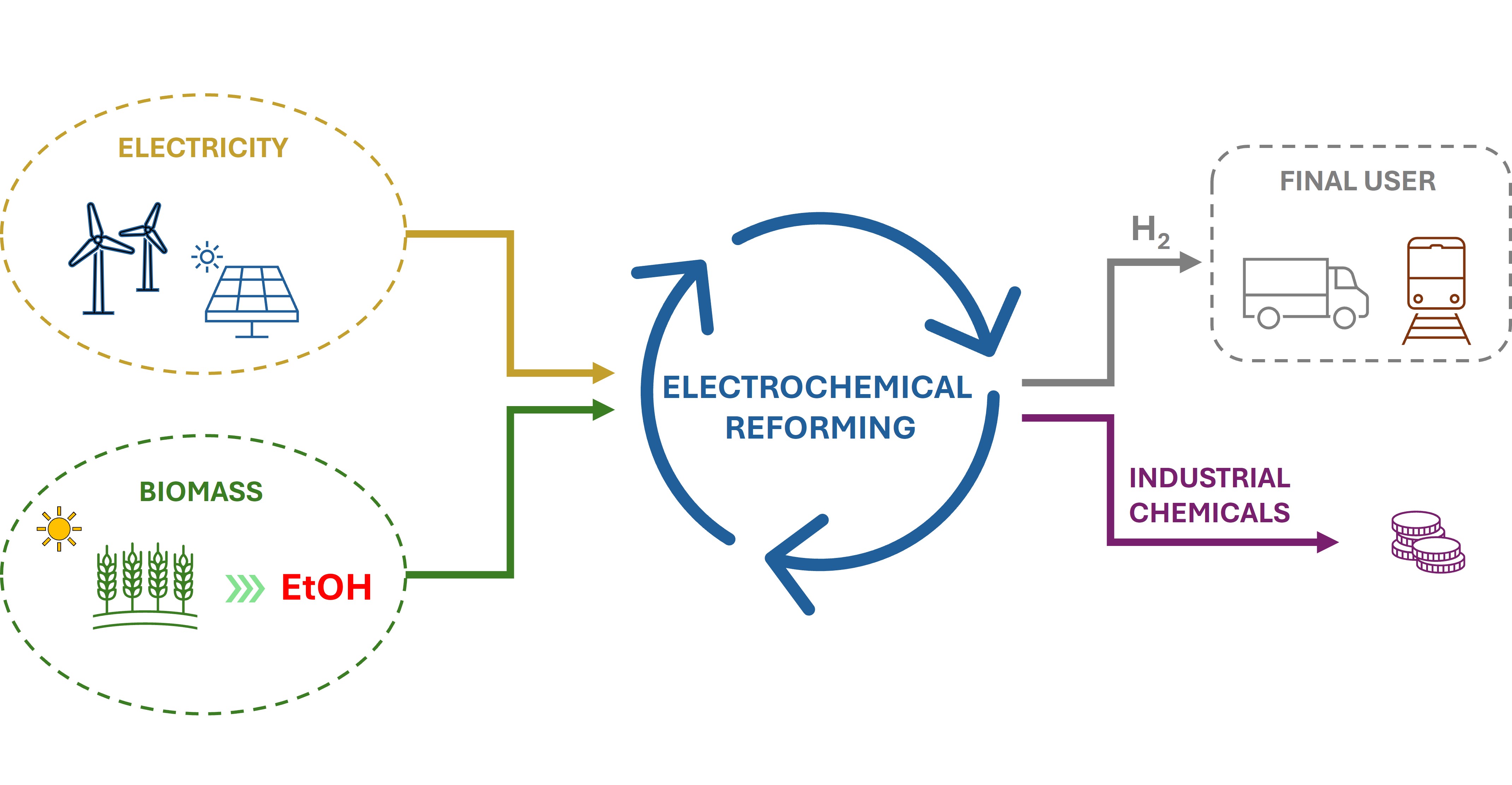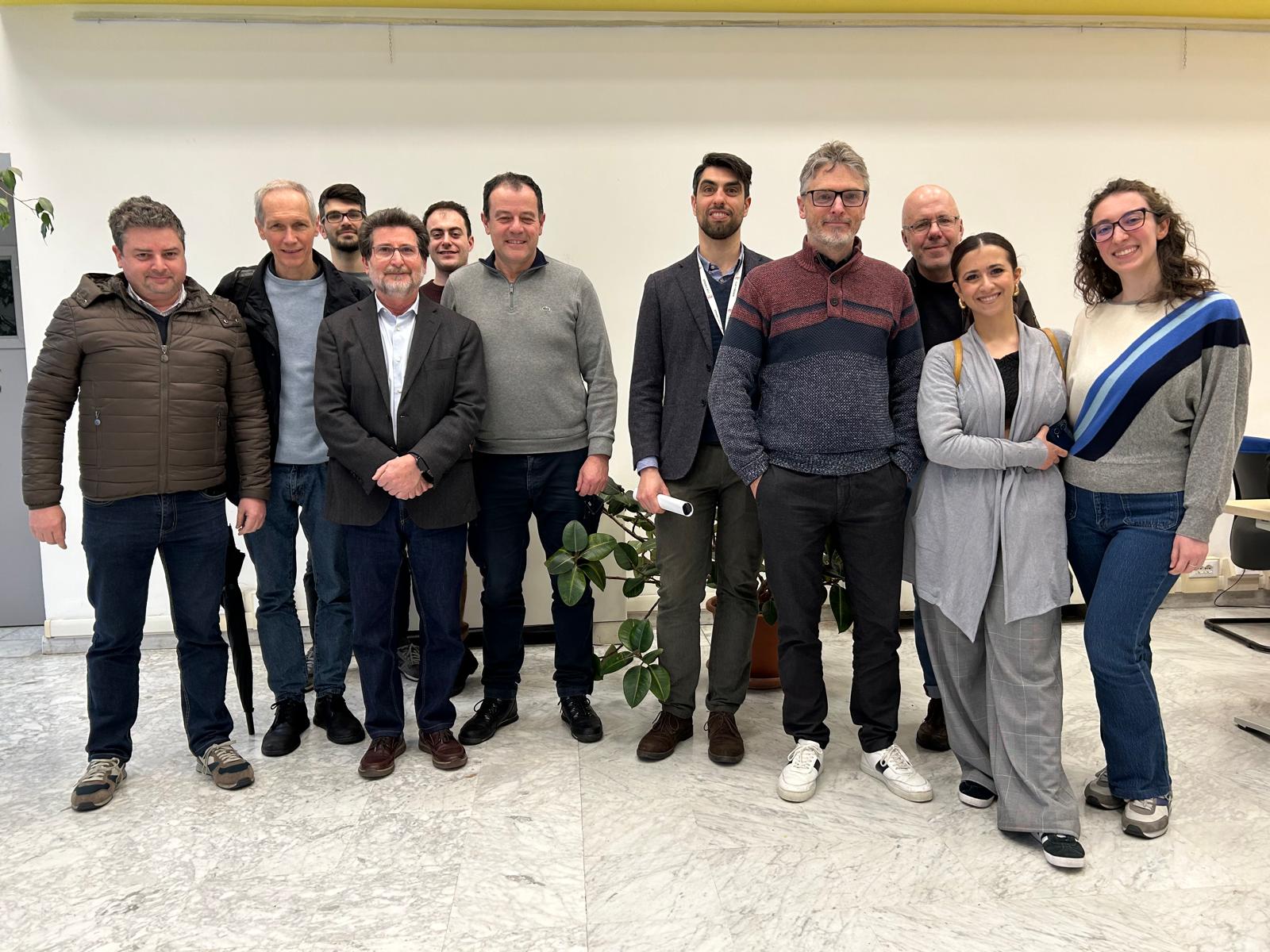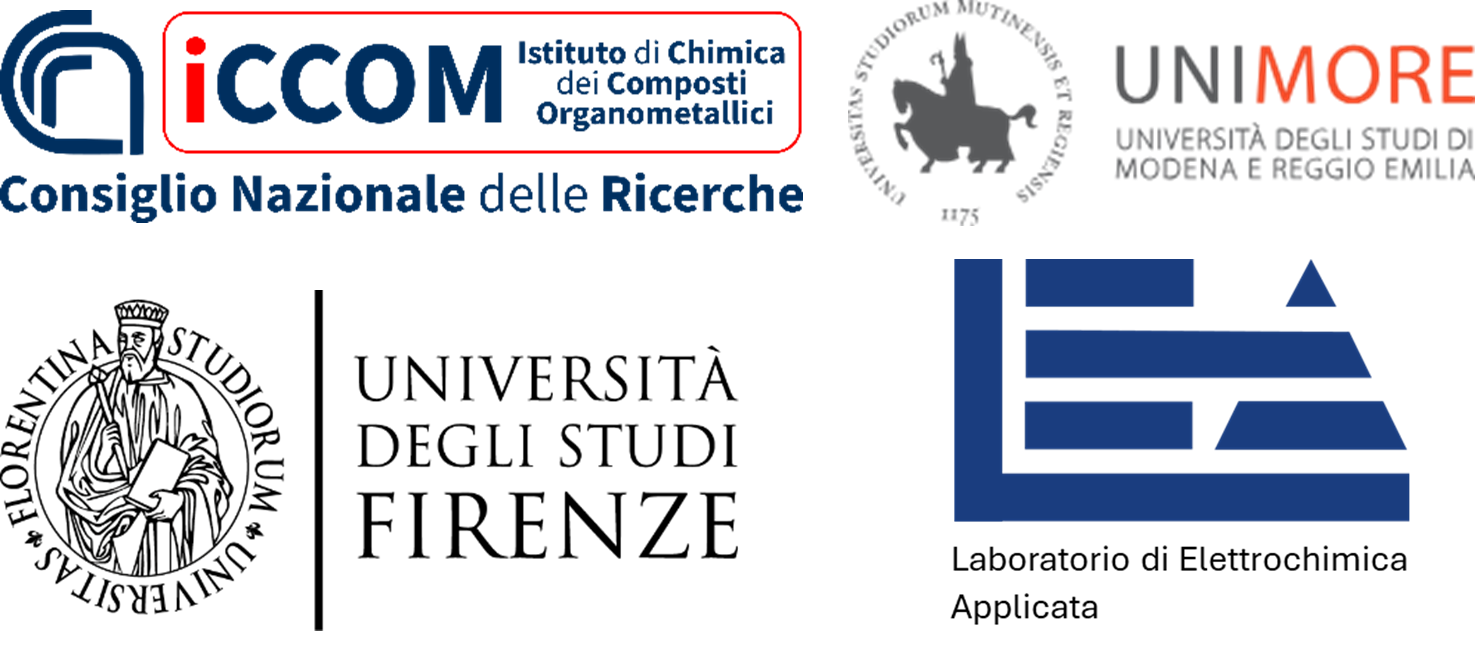PRIN 2022 “FUTURO”
PRIN: PROGETTI DI RICERCA DI RILEVANTE INTERESSE NAZIONALE – Bando 2022
Abstract- Dissemination of the result achieved

Title: From metal nanoparticles to molecular complexes in electrocatalysis for green hydrogen evolution and simultaneous fine chemicals production (FUTURO)
Project type: National. Duration: 24 months
Project 2022NW4P2T CUP B53D23013890006, Finanziato dall’Unione europea – NextGenerationEU e dal Ministero dell’Università e della Ricerca (MUR)
Abstract
The project introduces the co-production of green hydrogen and decarbonized chemicals through the electrochemical reforming of green feedstock and waste biomass recovery. Electrochemical reforming involves the oxidation of alcohols or sugar molecules at the anode of an electrolysis cell with H2 evolution at the cathode electrode. No oxygen is evolved reducing the risk of explosion from mixing with H2. Moreover, electrochemical reforming offers the possibility to produce H2 at high pressure, virtually eliminating energy-costly multistage compression. The product(s) of the alcohol oxidation are valuable industrially relevant mono or multi-carboxylate compounds (e.g. lactate and acrylate). The project will achieve its goal by developing and synthesizing molecular catalysts that have multiple advantages compared to metal-based nanoparticles: (1) Every single metal atom of the molecular complex is involved in the reaction, which may considerably reduce metal loading; (2) the rational design and optimization of molecular catalysts offer better selectivity and reactivity control, avoiding poisoning species. Molecular catalysts will be based upon transition metals with appropriate organic ligands that form organometallic complexes through metal ligand bonding. The molecular catalysts developed will be supported on conducting electrodes. In addition, a fundamental understanding of electrocatalytic pathways will be obtained through theoretical kinetic/thermodynamic studies with an integrated theoretical-experimental approach. Such studies will also help in designing the composition of the molecular complexes. Finally, optimized molecular catalyst electrodes will be fabricated and tested in complete electrolyzer supplied with biomass derived alcohols.

Keywords: Electrochemistry, Green Hydrogen, Molecular design, Green Chemistry, Uses and recycling of biomasses, Catalytic reactions
Dissemination of the result achieved
The dissemination of articles and communication about the project results are used to create awareness about the benefits and set the base for interaction with key stakeholders in the industry sector. Major communications are listed below.
Publications in scientific peer reviewed journals
(1) A. Girimonte, A. Stefani, C. Mucci, R. Giovanardi, A. Marchetti, M. Innocenti, C. Fontanesi. Electrochemical Performance of Metal-Free Carbon-Based Catalysts from Different Hydrothermal Carbonization Treatments for Oxygen Reduction Reaction. Nanomaterials, 2024, 14 173. https://doi.org/10.3390/nano14020173. (Open access)
(2) S. Gilioli, R. Giovanardi, A. Gemelli, A. Severini, F. Roncaglia, A. Carella, F. Rossella, D. Vanossi, A. Marchetti, R. Carmieli, C. Fontanesi, L. Pasquali, M. Montecchi, C. Ferrari. Charge‐transfer complexes: halogen‐doped anthracene as a case of study. Chemistry A European J, 2024, e202400519. https://doi.org/10.1002/chem.202400519.
(3) V. Monini, M. Bonechi, C. Bazzicalupi, A. Bianchi, P. Gentilesca, W. Giurlani, M. Innocenti, A. Meoli, G.M. Romano, M. Savastano. Oxygen reduction reaction (ORR) in alkaline solution catalysed by an atomically precise catalyst based on a Pd(II) complex supported on multi-walled carbon nanotubes (MWCNTs). Electrochemical and structural considerations. Dalton Trans. 2024, 10.1039.D3DT03947A. https://doi.org/10.1039/D3DT03947A. (Open access)
(4) F. Biffoli, D. Vanossi, E. Venuti, T. Salzillo, M. Bonechi, M. Innocenti, M. Pagliai, C. Fontanesi. Charge Transfer in Molecular Cocrystals: A Plane Wave vs Localized-Orbital View─Structural Information Obtained from Calculated Raman and IR Phonons, J. Phys. Chem. C 2024, 128, 14046–14055. https://doi.org/10.1021/acs.jpcc.4c03470
(5) F. Biffoli, M. Bonechi, M. Pagliai, M. Innocenti, R. Giovanardi, C. Fontanesi. Introducing the new concept of a chiral-polaron giant-IRAV signature, optical-active giant-response in vibrational circular dichroism, Phys. Chem. Chem. Phys. 2024, 10.1039.D4CP02876G. https://doi.org/10.1039/D4CP02876G
(6) M. Verrucchi, G. Mazzoli, A. Comparini, R. Emanuele, M. Bonechi, I. Del Pace, W. Giurlani, C. Fontanesi, R. Kowalik, M. Innocenti. Electrodeposition of Sn-Ru Alloys by Using Direct, Pulsed, and Pulsed Reverse Current for Decorative Applications. Materials, 2024, 17 5326. https://doi.org/10.3390/ma17215326. (Open access)
(7) C. Ferrari, A. Bogdan, F. Pop, C. Curto, A. Carella, F. Rossella, N. Avarvari, C. Fontanesi. Enantio‐Recognition and Charge Transfer Complex Formation Involving Tetrathiafulvalene‐Appended Chiral 1,2‐Cyclohexane‐Diamine: An Integrated Experimental and Theoretical Study. Chirality, 2024, 36 e70009. https://doi.org/10.1002/chir.70009. (Open access)
(8) G. Pappaianni, F. Montanari, M. Bonechi, G. Zangari, W. Giurlani, M. Innocenti. Electrodeposition of Nanostructured Metals on n-Silicon and Insights into Rhodium Deposition, Nanomaterials, 2024, 14 2042. https://doi.org/10.3390/nano14242042. (Open access)
(9) H.-Q. Hao, I. Hasan, R.E. Rodríguez-Lugo, I.A. Ansari, J. Sun, W. Fu, J.-C. Jin, C.-W. Hao. Design of a light-responsive 3D Cu-MOF for selective photodegradation of oxytetracycline remediation. J. Mol. Struct., 2025, 1345, 143036 https://doi.org/10.1016/j.molstruc.2025.143036
(10) M. Bonechi, C. Cappanni, P. Gentilesca, C. Bazzicalupi, W. Giurlani, M. Innocenti, L. Lari, F. Montanari, M. Savastano, M. Severi, A. Bianchi. From waste to fuel cells. In situ preparation of an atomically precise Pd(II)-catalyst by selective extraction of Pd(II) from a mixture of metal ions using modified multi walled carbon nanotubes (MWCNTs) and its implementation in the oxygen reduction reaction (ORR) in alkaline solution, Journal of Power Sources 639, 2025, 236661. https://doi.org/10.1016/j.jpowsour.2025.236661. (Open access)
(11) G. Pappaianni, F. Visconti, F. Montanari, M. Bonechi, C. Fontanesi, M. Pagliai, W. Giurlani, M. Innocenti. Electrodeposition of metals on silicon for enhanced silicon nanowires (NWs) Fabrication via metal assisted chemical etching (MACE), Electrochimica Acta, 2025, 535, 146705. https://doi.org/10.1016/j.electacta.2025.146705. (Open access)
(12) A. Stefani, C. Ferrari, A. Giacomino, S. Morandi, A. Marchetti, S. Mishra, C. Fontanesi. An unconventional electrochemical/solid-state-device integrated system: an electrochemical sensor based on the PCPDTBT polaronic state. Phys. Chem. Chem. Phys, 2025, 27, 19435–19444. https://doi.org/10.1039/D5CP02856F
(13) Y. Ayue, R.E. Rodríguez-Lugo, J. Liang, M. Bellini, L. Lu, I.A. Ansari, F. Jiang, M. Afzal, A. Alarifi. Design and environmental security application of a Cd(II) coordination polymer: Degradation and sensing of nitroaromatic compounds. Inorg. Chim. Acta, 2025, 584, 122746. https://doi.org/10.1016/j.ica.2025.122746
(14) A. Carella, S. Mishra, C. Ferrari, D. Vanossi, F. Rossella, F. Pop, N. Avarvari, H. Htoon, J.A. Hollingsworth, E.G. Bowes, S. Majumder, A.C. Jones, C. Fontanesi. Chiral induction at the nanoscale and spin selectivity in electron transmission in chiral methylated BEDT-TTF derivatives. Nanoscale, 2025, 17 2599–2607. https://doi.org/10.1039/D4NR04574B
(15) S. Mishra, A.C. Jones, C. Fontanesi. Recent advancements in chiral spintronics: from molecular-level insights to device applications. A prospect based on the interplay between physical and chemical properties of chiral systems. J. Mater. Chem. C, 2025 13 2121–2134. https://doi.org/10.1039/D4TC03453H
(16) W. Wu, I. Hasan, J. Wang, W. Yang, R.E. Rodríguez-Lugo, I.A. Ansari, F. Jiang. Design and photocatalytic performance of Cd(II)-based coordination polymers for selective PNP degradation. J. Mol. Struct., 2025, 1344, 14299. https://doi.org/10.1016/j.molstruc.2025.142991
(17) A. Severini, C. Ferrari, A. Marchetti, F. Vizza, M. Bonechi, M. Innocenti, V. Lagostina, E. Salvadori, M. Chiesa, F. Roncaglia, C. Fontanesi. Electrochemical oxidation of guaiacol as a sacrificial anodic process producing fine chemical derivative, for hydrogen production via electrolysis, International Journal of Hydrogen Energy, 2025, 124 345–354. https://doi.org/10.1016/j.ijhydene.2025.03.439. (Open access)
(18) A. Severini, C. Ferrari, M. Burello, F. Vizza, M. Bonechi, R. Chelli, M. Innocenti, F. Roncaglia, C. Fontanesi. The Role of Electronic Structure in the Hydrogen Evolution Reaction Dynamics as Catalyzed by Ru-based Complexes. Phys. Chem. Chem. Phys, 2025, 10.1039.D5CP03035H. https://doi.org/10.1039/D5CP03035H.
Posters & oral presentations in scientific conferences
[1] (oral) F. Biffoli, M. Bonechi, M. Pagliai, A. De Luca, C. Fontanesi, M. Innocenti. Chiral and Achiral Polycyclic Aromatic Hydrocarbon Conductors: A Theoretical Study on Vibrational Polaron Signature and Conceptualization of the Chiral Polaron Signature. 37th Topical Meeting of the International Society of Electrochemistry “Electrochemical Energy for a Greener and more Sustainable Future Society” Stresa, Italy, 9-12 June 2024.
[2] (poster) M. Bonechi, F. Biffoli, L. Lari, W. Giurlani, M. Savastano, A. Bianchi, A. Meoli, I. Maggini, M. Innocenti. Upcycling of Electroplating Industries Waste Waters: Pd-decorated Carbon Black and Graphene Catalysts for Oxygen Reduction Reaction. 37th Topical Meeting of the International Society of Electrochemistry “Electrochemical Energy for a Greener and more Sustainable Future Society” Stresa, Italy, 9-12 June 2024.
[3] (poster) M. Verrucchi, W. Giurlani, A. Pelagatti, G. Pappaianni, E. Mariani, C. Bazzicalupi, M. Innocenti. Variables evaluation on electrodeposition of palladium hydrides for hydrogen storage. 37th Topical Meeting of the International Society of Electrochemistry “Electrochemical Energy for a Greener and more Sustainable Future Society” Stresa, Italy, 9-12 June 2024.
[4] (Poster) G. Pappaianni, F. Montanari, W. Giurlani, C. Fontanesi, G. Mazzoleni, M. Innocenti. Electrodeposition of Thin Films and Nanostructures of Metals on n-doped monocrystalline Silicon for Energy Applications. 37th Topical Meeting of the International Society of Electrochemistry “Electrochemical Energy for a Greener and more Sustainable Future Society” Stresa, Italy, 9-12 June 2024.
[5] (poster) M. Bonechi, M. Savastano, F. Biffoli, C. Fontanesi, R. Kowalik, A. Bianchi, M. Innocenti. Advancements in Atomically Precise Catalysts for Oxygen Reduction Reaction: Insights into Electrochemical Activity and Structural Dynamics of a Pd(II) Complex Catalyst Supported on Multi-Walled Carbon Nanotubes. XXVIII National Congress of Società Chimica Italiana “Chemistry elements of future” SCI 2024. Milan 26th-30th August 2024.
[6] (oral) M. Bonechi, W. Giurlani, A. Marchetti, S. Campidelli, R. Kowalik, C. Fontanesi, M. Innocenti. Electrodeposition of PAH-Dendrimers via Electrochemical Oxidation an Integrated Experimental-Theoretical Approach. Pacific Rim Meeting on electrochemical and solid science, PRiME 2024 of The Electrochemical Society ECS. Honolulu, Hawaii USA, October 6-11 2024.
[7] (poster) M. Bonechi, I. Maggini, M. Savastano, L. Lari, E. Mariani, S. Bitossi, L. Bracci, A. Bianchi, C. Fontanesi, M. Pagliai. Obtaining Pd-Decorated Carbon Black and Graphene Catalysts from Electroplating Wastewater for Efficient Oxygen Reduction Reaction. 16th International Workshop on Electrodeposited Nanostructures EDNANO-16, Florence, Italy, April 10-12 2025
[8] (poster) C. Giovani, W. Giurlani, P. Nunziati, C. Borio, R. Kowalik, A. Dabizzi, A. De Luca, M. Innocenti. Electroplating in the presence of Microplastics: investigating their influence on copper deposition. 16th International Workshop on Electrodeposited Nanostructures EDNANO-16, Florence, Italy, April 10-12 2025
[9] (poster) F. Montanari, F. Biffoli, G. Becattini, G. Pappaianni, P. Gentilesca, M. Savastano, A. Bianchi, M. Pagliai, M. Innocenti. Oxygen reduction reaction (ORR) in alkaline medium catalyzed using atomically precise Pd (II) catalysts, prepared by extraction of Pd(II) from a mixture of metal ions using modified multi walled carbon nanotubes (MWCNT). 16th International Workshop on Electrodeposited Nanostructures EDNANO-16, Florence, Italy, April 10-12 2025
[10] (poster) M. Bonechi, F. Montanari, C. Giovani, G. Pappaianni, I. Maggini, M. Savastano, L. Lari, A. Bianchi, M. Innocenti. Pd-decorated Carbon Black and Graphene electrocatalyst for the oxygen reduction reaction by recovery of Pd(II) from wastewater. 247th ECS meeting (the electrochemical society meeting), Monreal, Canada 18-22 May 2025.
[11] (short oral) E. Mariani, M. Bonechi, I. Maggini, C. Giovani, L. Lari, M. Savastano, C. Fontanesi, A. Bianchi, M. Innocenti. Efficient palladium recovery and catalyst development from electroplating wastewater using functionalized carbon materials. International Conference on Environmental Catalysis ICEC 2025. Isola delle Femmine (PA - Sicily, Italy), 2-5 giugno 2025
[12] (oral) F. Montanari, M. Bonechi, C. Cappanni, P. Gentilesca, M. Savastano, M. Severi, A. Bianchi, M. Innocenti. Effective upcycling of Pd(II) waste into an atomically precise Pd(II)-based catalyst for alkaline fuel cells applications. International Conference on Environmental Catalysis ICEC 2025. Isola delle Femmine (PA - Sicily, Italy), 2-5 giugno 2025.
[13] (oral) M. Bonechi, F. Montanari, I. Maggini, G. Pappaianni, S. Bitossi, C. Giovani, M. Savastano, M. Pagliai, A. Bianchi, M. Innocenti. Electrocatalytic Activity of Pd(II) Complexes for Oxygen Reduction Reaction on Modified Electrodes. XXXI Congress of the Division of Analytical Chemistry of the Italian Chemical Society, Pisa, 7-11 September 2025
[14] (poster) R. Rodriguez. Light-Promoted Arylation of Carboxylates Catalyzed by Nickel Complexes Bearing Xanthine-Derived Ligands. INORG25, 50th Conference of the Inorganic Chemistry Division “Divisione di Chimica Inorganica” of the Italian Chemical Society, Naples,09-12 September 2025.
[15] (oral) M. Bonechi, F. Montanari, E. Mariani, I. Maggini, M. Savastano, S. Bitossi, C. Fontanesi, A. Bianchi and M. Innocenti. Oxygen Reduction Reaction Electrocatalysts from Industrial Wastewater Recovery. National Congress of the Electrochemistry Division of the Italian Chemical Society “Giornate dell'Elettrochimica Italiana”, GEI 2025, San Benedetto del Tronto, 15-19 September 2025.
[16] (oral) C. Giovani, W. Giurlani, F. Montanari, G. Mazzoli, A. Dabizzi, M. Innocenti. From Pollutants to Process Modifiers: Nylon-based Microplastics in Copper Electroplating Baths. National Congress of the Electrochemistry Division of the Italian Chemical Society “Giornate dell'Elettrochimica Italiana”, GEI 2025, San Benedetto del Tronto, 15-19 September 2025.
[17] (poster) G. Pappaianni, M. Bonechi, F. Visconti, S. Mistretta, A. Paon, W. Giurlani, M. Innocenti. Electrodeposition-Enabled Fabrication of Enhanced Silicon Nanowires via Metal-Assisted Chemical Etching (MACE). National Congress of the Electrochemistry Division of the Italian Chemical Society “Giornate dell'Elettrochimica Italiana”, GEI 2025, San Benedetto del Tronto, 15-19 September 2025
[18] (poster) F. Montanari, C. Giovani, M. Bonechi, P. Gentilesca, M. Savastano, M. Severi, A. Bianchi, M. Innocenti. From waste to clean energy. Oxygen reduction reaction (ORR) in alkaline medium catalyzed by an atomically precise Pd (II) catalyst, prepared trough selective extraction of Pd (II) from wastewater. National Congress of the Electrochemistry Division of the Italian Chemical Society “Giornate dell'Elettrochimica Italiana”, GEI 2025, San Benedetto del Tronto, 15-19 September 2025.
[19] (oral) R. Rodriguez. Bio-Based or Bio-Inspired N-Heterocycles as Donors for Coordination Chemistry and Homogeneous Catalysis. ICCOM DAYS 2025, Bari, 9-10 October 2025.
[20] (poster) R. Rodriguez. Tris(8-quinolinyl)phosphite: coordination and catalysis using a potentially tripodal PN3-type chelate. ICCOM DAYS 2025, Bari, 9-10 October 2025.
[21] (poster) R. Rodriguez. Light-Promoted Arylation of Carboxylates Catalyzed by Nickel Complexes Bearing Xanthine-Derived Ligands. Giornate Scientifiche di Dipartimento, DSTM-CNR, Bologna, 21-23 October 2025
[22] (oral) M. Bonechi, F. Montanari, P. Gentilesca, C. Bazzicalupi, W. Giurlani, M. Savastano, M. Severi, L. Lari, A. Bianchi, M. Innocenti. Analytical characterisation of an atomically precise electrocatalyst for the Oxygen Reduction Reaction obtained by selective recovery of Pd(II) from wastewater. Interregional Congress of the Sections of Tuscany, Umbria, Marche, and Abruzzo of the Società Chimica Italiana (Italian Chemical Society) “The Conference of Cross-cutting Novelties in Chemistry” (TUMA2025). Florence, 20-21 November 2025
[23] (oral) M. Bonechi, C. Giovani, R. Rodriguez, R. Chelli, F. Vizza, C. Fontanesi, M. Innocenti. Electrochemical reforming of alcohols for the co-production of green hydrogen and valuable organic compounds: analytical characterisation of ruthenium-based molecular catalysts. Chemistry under the Tree, 2025 edition “Building Peace Through Chemical Bonds,” national conference organized by the Italian Chemical Society. Bari 18-19 December 2025.

https://www.lea.unifi.it/ - http://www.iccom.cnr.it/ - https://prin.mur.gov.it/Home


Ultimo aggiornamento
24.02.2026
